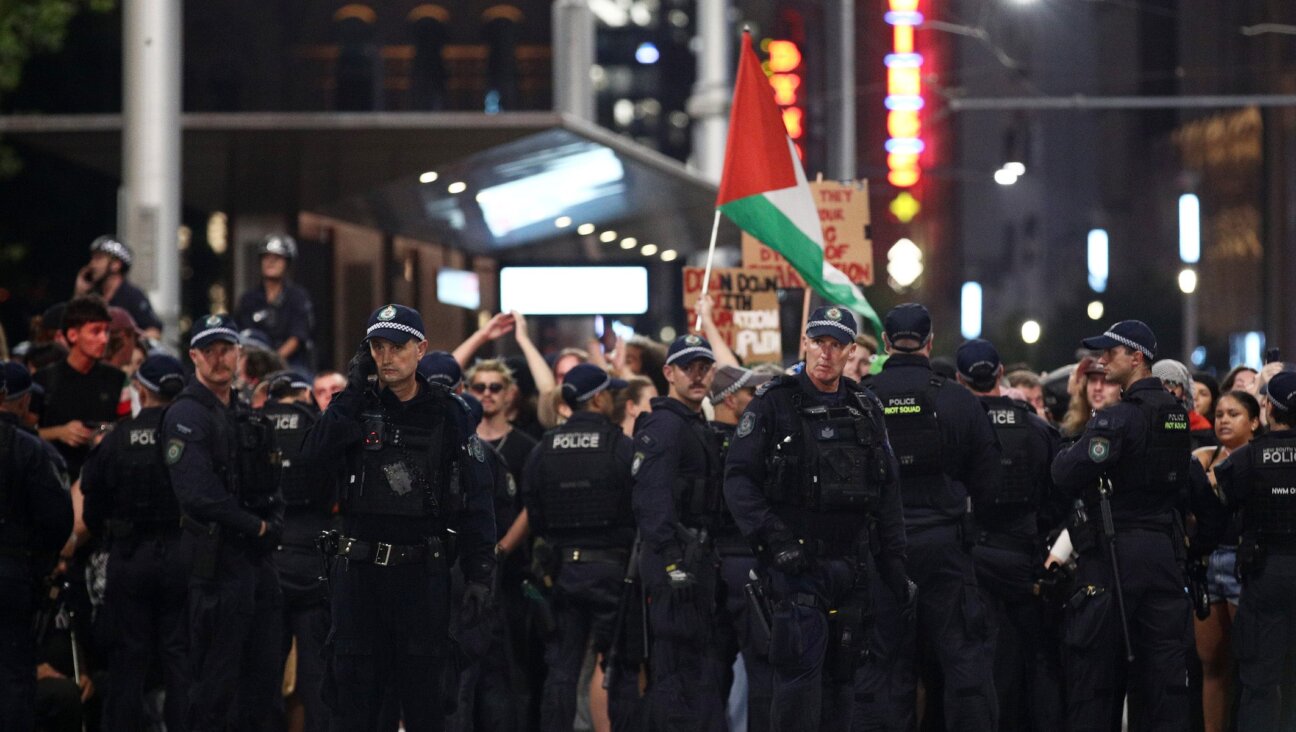Single Mothers’ Protest Losing Support
JERUSALEM — When single mother Vicky Knafo set out on foot from her home in the Negev July 1, she was alone. When she finished her 125-mile protest march — intended to bring attention to proposed economic measures that would hurt single mothers — in Jerusalem one week later, she had attracted a throng of supporters. As the protest enters its second month, 180 people are still camped out along the boulevard facing the Finance Ministry.
Yet there may not be strength in numbers. Polls in Israel show support for Knafo’s cause declining dramatically. Perhaps it is due to the oppressive summer heat or the media hordes that quickly grew tired of publicizing her story. Or maybe it is because the movement that Knafo spawned has grown too large and too broad, diluting its once-singular message.
Sitting inside the communal space set up between two tents, the 43-year-old Knafo said she feels a little used by the other groups who have “hitched a ride” on her protest march.
“I came here as a one-woman fight,” she told the Forward, explaining how the protest began as a quiet struggle with no violence, a protest against cuts to welfare and income supplements that particularly affected single mothers like Knafo with part-time jobs. Knafo’s march was aimed at maintaining her income supplements, which she said allowed her to raise her three children on a part-time, minimum-wage cook’s salary.
“But then slowly everyone started coming — the unemployed, people who don’t have food — and I told them that it’s not right, they shouldn’t be here, it’s my fight, my struggle. But they won’t listen. They say, ‘You can’t tell us what to do, you don’t own this area, we can do whatever we want.’ And there is nothing I can do about it. Our struggle has been pushed to the corner because of this; we’re losing because of this.”
The public, meanwhile, is growing steadily less interested in the cause. According to a poll published in the Israeli business daily Globes last week, 48% of Israelis support the single mothers’ movement, down from 69% two weeks before. Only one-third say the movement will gain strength — down from nearly two-thirds two weeks earlier; most respondents now predict the movement will fade and disappear.
Globes noted that the survey was taken before some of the economic plan’s elements have had their full impact. A further cut in child allotments is scheduled to take effect on August 20.
But the public’s outrage over economic policy may be waning for another reason: New economic figures from Benjamin Netanyahu’s Finance Ministry this week optimistically indicate that the economy is turning a corner. The ministry reported consumer confidence up — a direct result of the optimism surrounding the cease-fire — with July 2003 sales up from July 2002 by margins ranging from 12% for dishwashers to 20% for cars and a full 95% for VCRs.
Social activists dismissed the ministry’s optimism as premature, saying employment hadn’t budged and the rush to the stores was just a momentary response to the cease-fire.
Knafo said she doesn’t place much faith in figures quoted to her by ministers and economists. Her meetings with various public figures — one each with Netanyahu, Industry, Trade and Labor Minister Ehud Olmert, Labor and Social Affairs Minister Zevulun Orlev, President Moshe Katsav and Minister without Portfolio Meir Sheetrit — have left her disheartened.
“There were meetings, but we came out with the same disappointment as we went in,” she said. “You go to these meetings, and they have done their homework — they all answer the same things.”
The government is struggling to maintain its economic plan without seeming insensitive to the single mothers’ demands. The social-economic Cabinet was expected to meet this week to vote on a plan for single-parent families drawn up by the Finance and Industry and Trade Ministries.
At a meeting last week, Olmert told the single mothers that creating new jobs for them was a top priority and that there were already 6,000 new jobs available. A spokeswoman for the group criticized Olmert after the meeting, saying his plan did not offer any immediate solutions and would not make any difference to the conditions that originally led the single mothers to set up their protest tents.
Support for the protesters comes from many sources. As Knafo talked, a group of 30 Druze women from northern Israel came to sit with her in solidarity. It is a small commune here on the sidewalk, with 50 tents, each numbered, set up side by side. One tent is actually a sukkah, with the same thatched roof used for holiday booths. Blankets are hung out to air on police barricades, and towels are slung across tent frames to dry. A couple of dogs, protesters’ family pets, are there to give support as well, if not companionship. Hand-written signs and graffiti are everywhere, and passersby stop to take pictures of it all.
There has been dissent within the crowd, however, with the spawning of a more militant group that led to fistfights among the women over the distribution of donated goods. Last Thursday, members of the breakaway group wrapped themselves in newspapers and lay across the road. Ayala Sabag, the group’s leader, said the protest was an expression of “all the stories of hardship written in the papers which are then discarded in the trash.”
Regardless of dissent within the ranks, or dissipating public interest, Knafo is digging in for the long haul. “I’ll stay as long as I have to,” she said in a voice more determined than boastful. “Even if the other mothers want to go home.” She has pledges from sympathizers to keep the tents warm in the winter, and a local hotel has invited the demonstrators for the holidays.
As for the disinterested media, Knafo says the group is planning new initiatives to draw them back to her cause. Besides, she said, she isn’t bothered by not being in the paper every day. “We’re important, but there are still more important things going on, like the missing soldier who they found, and the hudna.”
And what will she do when it’s all over, and the lights go out on the media star?
“I’m not a star, I’m Vicky Knafo, I’m just like everyone else. As far as I’m concerned, I’m just the symbol that’s going to win this struggle. They’ll talk about it in history, but I’m still going to be Vicky. I want to go home to my quiet house.”
But her neighbors, Knafo said, expect more from her. “They said to me, ‘Either you win or you come back in a coffin.’ They’re not interested in losing. They want a hero.”















